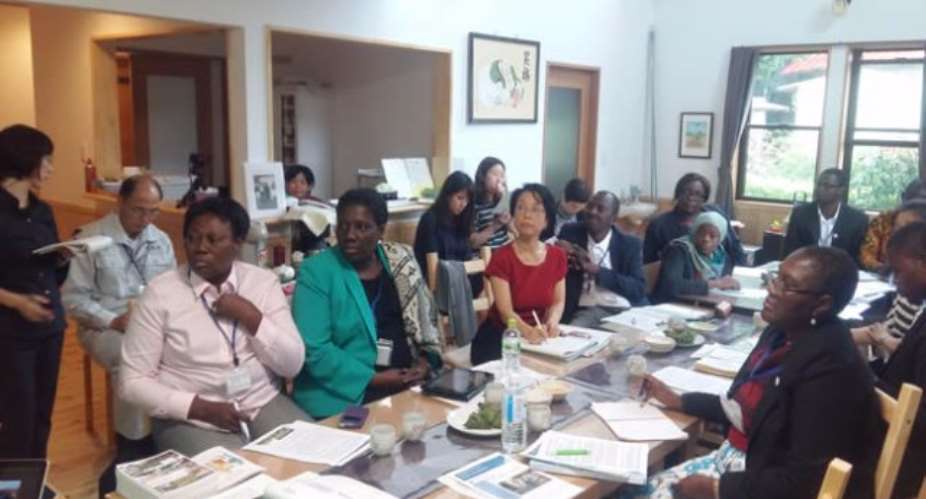A team of Ghanaians who left for Tokyo, Japan on an experiential course to study the Japanese multi-sector approach to tackling nutrition challenges has arrived home.
The team was taken through the exciting Japanese food culture with a view to establishing that culture in Ghana.
Japan is seen as one of the most nutrition conscious nations in the world. The country has a comprehensive system aimed at inculcating good nutrition habits in its people from child birth, a member of the team Kweku Botwe said on his return
The 11-member Ghanaian team is made up of people from diverse backgrounds including health, education, finance, academia (research), agriculture, communication, regulation and policy.
The programme, which is being sponsored by the Japanese International Cooperation Agency (JICA) is the third of its kind for Ghana. It is a country-specific programme designed to help equip participants with skills, champion issues of nutrition as a development agenda as well as address nutrition challenges in Ghana.
SCALING UP NUTRITION (SUN)
Ghana, in collaboration with its development partners, has come up with a number of nutrition interventions but these interventions have usually been sector– specific without any efforts to link efforts by the various sectors.
This usually results in duplication of efforts and the inability to consolidate them.
As part of plans to help consolidate the nutrition agenda in the country, Ghana joined the Scaling Up Nutrition (SUN) Movement in 2010.

The SUN came into being when world leaders became convinced that a lot of the problems being faced by developing nations can be traced to poor nutrition.
Their conviction was based on a series of research works which were published in the world-acclaimed media Scientific Journal, The Lancet, in 2008, giving empirical evidence to the role nutrition plays in building the critical, healthy human resource of every nation.
For instance, it has been well documented that the type of food fed to an infant can have a direct effect on his or her cognitive abilities or intelligence.
The ability of an individual to stay focused and concentrate on work during the day without unnecessarily becoming weak has been linked to one’s food habits, Botwe noted.
Shokuiku (Healthy Diet Education)
Among the issues to be studied under the programme include how the Japanese government has been able to rally the whole country around the promotion of good nutrition, especially among school children, a commitment which has led to a national week of nutrition promotion and education called Shokuiku.
Shokuiku events bring together diet and nutrition players together for a comprehensive education and discussion on nutrition.
The stakeholders include academics, NGOs, Associations, Food Companies, Volunteers, Farmers and Dieticians.
The Shokuiku is a platform where individuals get every consultation related to nutrition free of charge. Nutrition education is interspersed with games, competitions and rewards; all aimed at increasing people’s knowledge in nutrition.

The team would later study how Japan has been able to successfully implement its school lunch programme with covers more than 90 percent of elementary schools and 80 percent of junior high schools.
The Japanese school lunch programme goes beyond just feeding school kids balanced diet at lunch time to include a total nutrition education.
Kids have the opportunity to know the nutrients in foods provided and the importance to the body. To help kids appreciate the source of the food they eat, they are occasionally sent to farms where they observe and participate in planting and harvesting of food as well as engage with the farmers.
That is to say the Japanese school lunch programme has the overarching aim of imbibing into children a good food culture.
The team will then consider how the municipal and district assemblies will coordinate activities in developing a national nutrition program with specific goals and objectives.
In order to generate the evidence for the continuous investment in nutrition, Japan continuously engages in nutrition research in the form of an Annual Health and Nutrition Surveys.
The Ghanaian team will investigate how such a task is sustained and executed annually.
The group is expected to present an action plan to help scale up nutrition interventions in Ghana.
Story by Ghana|Myjoyonline.com





 This IMANI job no dey pap; the people you are fighting for are always fighting y...
This IMANI job no dey pap; the people you are fighting for are always fighting y...
 Prof. Naana Opoku-Agyemang has changed; you can see a certain sense of urgency –...
Prof. Naana Opoku-Agyemang has changed; you can see a certain sense of urgency –...
 MFWA Executive Director slams Akoma FM for engaging in ‘irresponsible’ media pra...
MFWA Executive Director slams Akoma FM for engaging in ‘irresponsible’ media pra...
 ‘Women must become millionaires too’ — Prof Jane Naana on establishment of Women...
‘Women must become millionaires too’ — Prof Jane Naana on establishment of Women...
 Some believe only in Ghanaian votes, not Ghana — Kofi Asare jabs politicians
Some believe only in Ghanaian votes, not Ghana — Kofi Asare jabs politicians
 Plan to make BEST sole aggregator of Sentuo Oil Refinery will create market chal...
Plan to make BEST sole aggregator of Sentuo Oil Refinery will create market chal...
 2024 elections: I can't have the man I removed from office as my successor — Aku...
2024 elections: I can't have the man I removed from office as my successor — Aku...
 2024 Elections: Immediate-past NPP Germany Branch Chairman garners massive votes...
2024 Elections: Immediate-past NPP Germany Branch Chairman garners massive votes...
 Gov’t focused on making Ghana energy self-sufficient, eco-friendly – Akufo-Addo
Gov’t focused on making Ghana energy self-sufficient, eco-friendly – Akufo-Addo
 April 25: Cedi sells at GHS13.74 to $1, GHS13.14 on BoG interbank
April 25: Cedi sells at GHS13.74 to $1, GHS13.14 on BoG interbank
